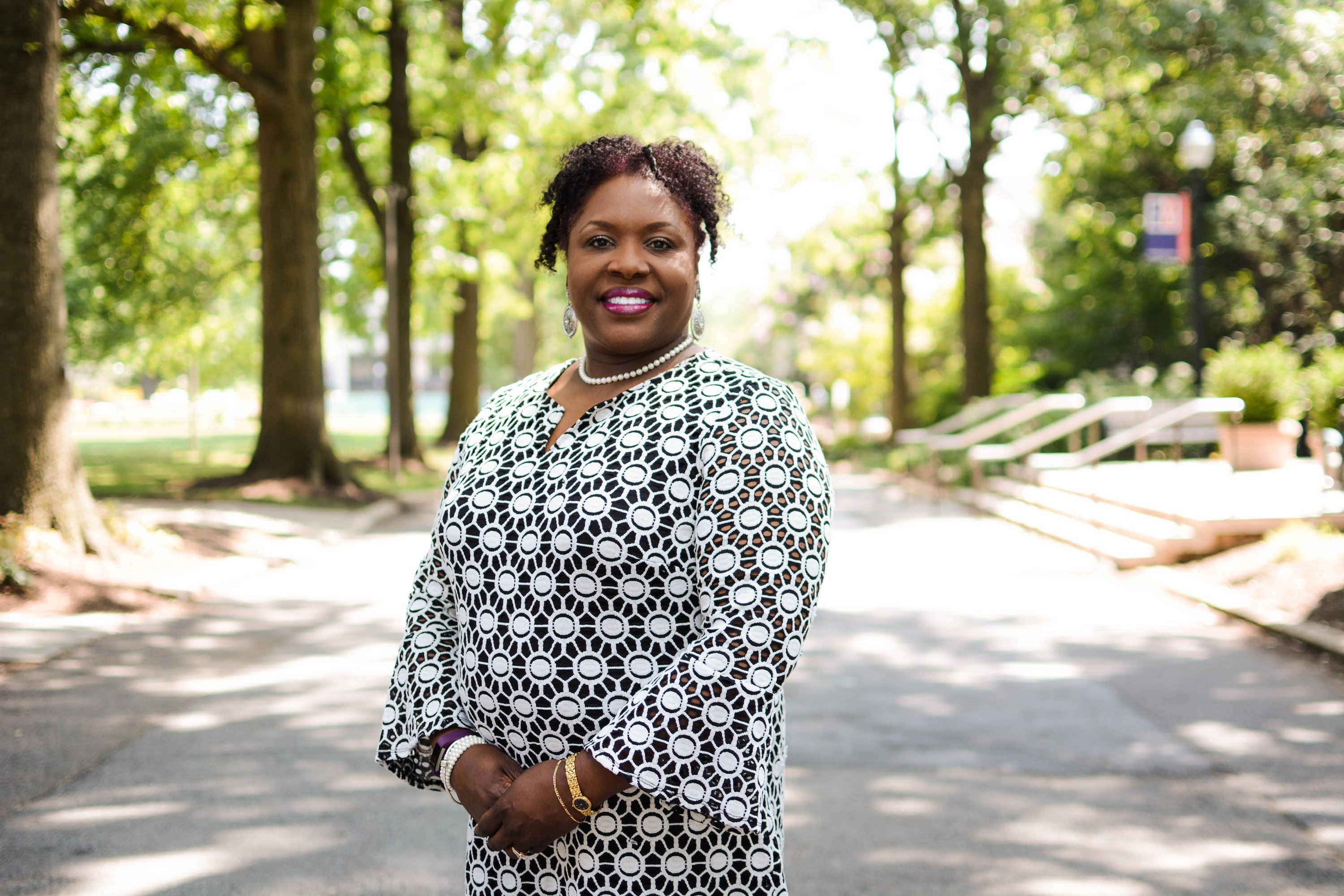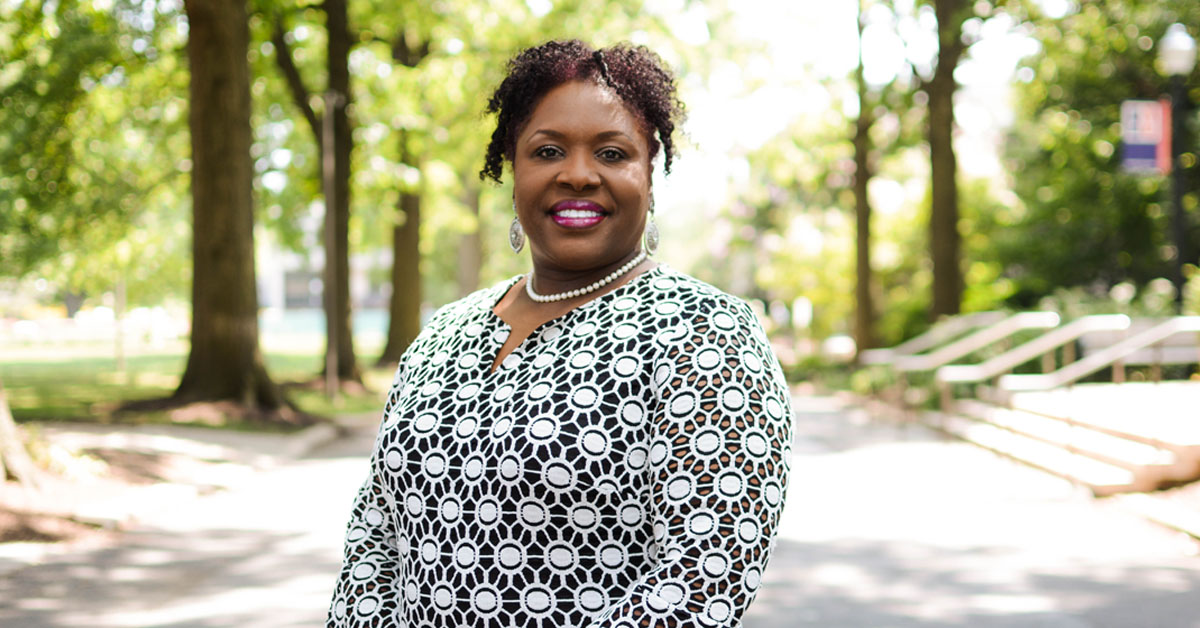What do diversity, equity, and inclusion look like in a university setting? Who are the stakeholders of diversity initiatives? These are challenging questions, and the Kogod School of Business’s new assistant dean of diversity, equity, and inclusion, Stacy Merida, is finding answers. Merida, who teaches music entertainment industry classes in Kogod’s business and entertainment program, accepted the position in January 2021. She is leading the school not only in learning what these terms mean to its students, faculty, and staff but also in implementing meaningful changes based on input from the entire Kogod community.
Merida has a broad view of diversity, equity, and inclusion (DEI) that not only comprises demographic characteristics like gender, race, and ethnicity but all dimensions of a person’s identity, such as immigrant and first-generation status, economic background, education, and more. Of course, some of these characteristics are more salient to people’s identities, and some, because they are more visible to society, affect how people are treated more than less readily observable traits.
One of our strategic goals is to cultivate a more diverse, equitable, and inclusive Kogod culture where every individual, regardless of background, has the full opportunity to flourish and thrive.”

Stacy Merida
Kogod's Assistant Dean of Diversity, Equity, and Inclusion
The daughter of a civil rights leader, Merida has been passionate about social justice since her childhood in Alabama. And that passion has driven her throughout her career. Her PhD dissertation examined cultural competency and proficiency in higher education administration. She serves as a board liaison for diversity and inclusion at the Music Entertainment Industry Educators Association (MEIEA) and represents American University as a committee member on the GRAMMY Museum’s diversity, equity, inclusion, and accessibility affiliate committee. Her most recent initiative was reaching out to Historically Black Colleges and Universities (HBCUs) and Hispanic and Tribal Universities to join the MEIEA through free membership.
In her new role as assistant dean, she will implement several initiatives that include creating a DEI task force, DEI fellowships, policy and procedure reviews, ongoing training, and surveying faculty, students, and staff. Her goals include ensuring students and staff reflect the diversity of our global society and transforming the faculty’s makeup to reflect the diversity of the student body. Another major goal is improving the academic outcomes for students from underrepresented, low-income, and other marginalized groups, in addition to securing transparent and more equitable outcomes for staff and faculty.
Diversity, as the word connotes, is about difference. But it is not about eliding or ignoring that difference. Rather, it is about ensuring that difference doesn’t lead to inequitable outcomes.
“There are distinct differences between equality and equity,” Merida explains. “Equity involves giving people what they need to be as successful as non-minoritized groups; conversely, equality is to treat everyone the same.”
Diversity is valuable in all areas but especially important in business. When a company has a diverse culture, it welcomes more viewpoints, allowing it to reach a wider audience. According to a McKinsey & Company report, “Companies in the top-quartile for ethnic/cultural diversity on executive teams were 33 percent more likely to have industry-leading profitability.” Google recently completed a study, Project Aristotle, that identified psychological safety as one of the most important factors of a high-performing team. Employees feeling included and able to be their authentic selves at work frees up their minds and energy to focus on their performance.
“Diversity is extremely important in the business community where different perspectives are and should be highly valued,” says Merida. “Organizations that value diversity and inclusion strive to provide a space where all members are respected. If a system or structure perpetuates inequity and inequality, we should encourage one another to challenge this system or structure.”
Merida is also acutely aware that no one holds just one identity. The term intersectionality, coined by Black feminist legal scholar Kimberlé Crenshaw in 1989, describes how individual characteristics like race, class, and gender interact with each other to form how someone sees—and is seen by—the world.
“Our students will find themselves working with employers, coworkers, and clients from diverse backgrounds,” explains Merida. “By experiencing diversity, we are laying the groundwork for all to be comfortable working and interacting with a variety of individuals of all nationalities.
“However, efforts in this space are nothing new as Kogod is ranked no. 9 by the recent Bloomberg Newsweek Diversity Index for its long-term commitment to diversity. I am exhibit A, as the creation of my position only exemplifies the continuation and broadening of Dean Delaney’s and the DEI committee’s visionary leadership. We are intentional in being the guiding example for our students, faculty, and staff.”
Merida’s new role is a testament to the hard work she and the Kogod community continue to engage in to create a diverse, equitable, and inclusive business school that prepares students not only for successful careers but to be thoughtful, compassionate, and engaged citizens of the world.
